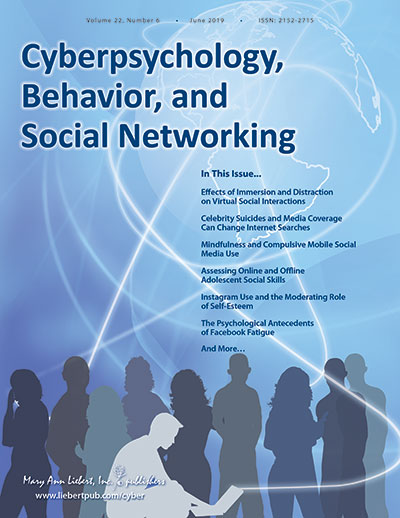For Immediate Release
Does Greater Immersion in Virtual Reality Lead to a Better Experience?
Contact: Kathryn Ryan
914-740-2250
kryan@liebertpub.com

New Rochelle, NY, June 18, 2019—Contrary to current industry trends to develop more immersive virtual reality systems, a new study found that a more immersive environment or the presence of real-world distractions could have surprising effects on a participant’s recall, description of the virtual encounter, and how positive they feel about the experience. The design, results, and implications of this timely study are published in Cyberpsychology, Behavior, and Social Networking, a peer-reviewed journal from Mary Ann Liebert, Inc., publishers. Click here to read the full-text article free on the Cyberpsychology, Behavior, and Social Networking website through July 18, 2019.
“The Effects of Immersion and Real-World Distractions on Virtual Social Interactions” was coauthored by Jeremy Bailenson, Catherine Oh, and Fernanda Herrera, Stanford University, CA. The researchers designed a study in which participants interacted with a virtual agent in either an immersive or non-immersive virtual environment with three levels of real-world distractions: no distractions; passive exposure to the sound of a ringing cell phone; actively answering a ringing cell phone. Whereas increased immersion had a positive effect on feeling present in the virtual reality interaction, it had a negative effect on recognition and recall.
“This very important study highlights again the critical need to understand the role of realism during the VR experience. The clarity of the latest PlayStation characters, for example, or those seen in recently released movies and video clips begs the question of whether the uncanny valley has been overcome,” says Editor-in-Chief Brenda K. Wiederhold, PhD, MBA, BCB, BCN, Interactive Media Institute, San Diego, California and Virtual Reality Medical Institute, Brussels, Belgium. “Despite over 20 years of research, we still do not fully understand how levels of realism can differentially affect human perception and the underlying psychological milieu. Many VR clinicians have shown that in certain cases, less granular or admittedly more cartoonish avatars and graphics produce better clinical outcomes. On the other hand, in certain types of surgical training, realistic VR is both justified and necessary. There remain many unanswered issues and a lack of good objective measures for our feeling of presence, and this paper plays a crucial role in furthering our knowledge.”
About the Journal
Cyberpsychology, Behavior, and Social Networking is an authoritative peer-reviewed journal published monthly online with Open Access options and in print that explores the psychological and social issues surrounding the Internet and interactive technologies. Complete tables of contents and a sample issue may be viewed on the Cyberpsychology, Behavior, and Social Networking website.
About the Publisher
Mary Ann Liebert, Inc., publishers is a privately held, fully integrated media company known for establishing authoritative peer-reviewed journals in many promising areas of science and biomedical research, including Games for Health Journal, Telemedicine and e-Health, and Journal of Child and Adolescent Psychopharmacology. Its biotechnology trade magazine, GEN (Genetic Engineering & Biotechnology News), was the first in its field and is today the industry’s most widely read publication worldwide. A complete list of the firm’s 80 journals, books, and newsmagazines is available on the Mary Ann Liebert, Inc., publishers website.